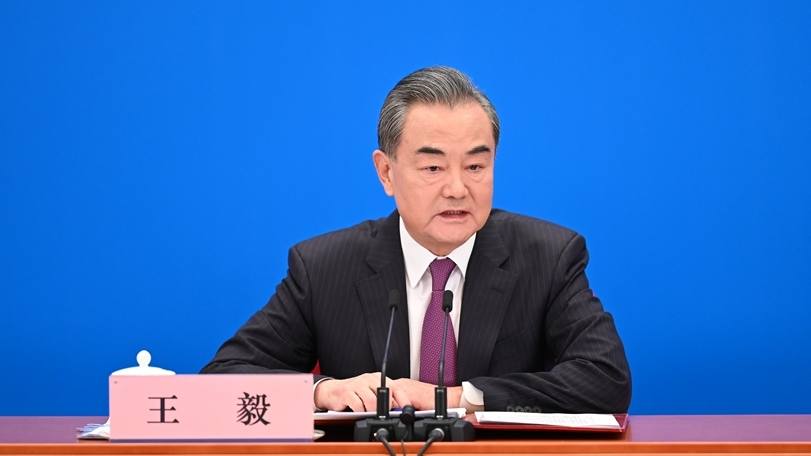
Wang Yi, director of the Office of the Foreign Affairs Commission of the Communist Party of China Central Committee, answers questions about China-EU relations at a press conference in Beijing, China, March 7, 2022. [Photo/Xinhua]
By Hannan Hussain
On February 14, Wang Yi, director of the Office of the Foreign Affairs Commission of the Communist Party of China (CPC) Central Committee, began a four-nation trip to Europe, which includes visits to France, Italy and Hungary. All three countries are seen as critical partners in China's broader cooperation with the European Union. The significance of the trip is also captured by the lead-up to the 20th anniversary of the establishment of the landmark China-EU comprehensive strategic partnership. Beijing remains keen to engage with its European partners to give a head-start to this year's high-level China-EU exchange, a key constant to elevate economic and trade ties beyond competing perceptions.
Over the years, EU-China strategic cooperation has truly come a long way, underlining the value of European strategic autonomy to new, seamless progress with China. For instance, they concluded in principle the Comprehensive Agreement on Investment (CAI) which sets an example for a "values-based investment relationship." Its focus on bridging divides and integrating two colossal markets came across as another win for delicate diplomacy.
Despite follow-up movements facing some headwinds of late, there remains a strong incentive for Europe to promote new access points for businesses for its own advantage. Europe's current pursuit for accelerated economic recovery, trade growth, and investment self-sufficiency makes follow-up movements on CAI vital to inject optimism on all three fronts. The past two decades have seen a substantial increase in trade with China, and propelled the EU's status to one of the most dependable investors in the Chinese market.
Wang's focus on "in-depth strategic communication" with the political heads of France, Italy and Hungary can play a meaningful role in compartmentalizing differences with the EU. Such high-level engagement can effectively improve the political environment in Europe vis-a-vis China, as some manageable roadblocks to high-value economic, trade and strategic cooperation come into view. What matters is the luxury of managing differences through frank and constructive dialogue. To both sides' credit, China-EU ties have used such engagement to frequently break new ground, including through hard-earned political approval for CAI in late 2020.
Paris has played a productive role in bridging differences and advancing common ground between EU and China. Its support for opening up and expanding market access has struck a common chord with Beijing, and identified closely with the EU's comprehensive strategic partnership vision with China. During the meeting between French President Emmanuel Macron and Wang Yi, the two sides agreed to enhance China-EU communication and properly handle the differences, and jointly tackle global challenges.
In a similar light, Wang's visits to Hungary and Italy hold strategic opportunities for China-EU ties. The former's enduring commitments under the Belt and Road Initiative are set to be sustained, having demonstrated genuine coexistence with China's development and revitalization for so long. In fact, Beijing has shown confidence in Italy and Hungary's ability to inform an objective, independent and positive view of China within the EU, effectively supporting the case for strategic autonomy as some European states see fit.
The conclusion of Wang's tour with a speech at the 2023 Munich Security Conference can offer a blend of European and Chinese perspectives on major international issues. For Beijing's part, its stated priorities on a "common, comprehensive, cooperative and sustainable" security vision are amply relevant to Europe's pursuit for a sustainable security architecture amid a plethora of challenges. These include energy pressures, trade woes and a protracted Russia-Ukraine conflict.
Only by treating diplomacy as the lifeblood of their strategic communications, can Beijing and its European partners work towards a more cooperative security approach that is in line with their positions on major international issues.
Rising global turbulence, divisions and uncertainty are unlikely to wane on their own. A China-EU relationship is fundamental to a resilient response, and to prepare the ground for new progress between them.
Hannan Hussain is a foreign affairs commentator and author. He is a Fulbright recipient at the University of Maryland, the U.S., and a former assistant researcher at the Islamabad Policy Research Institute.

 中文
中文



